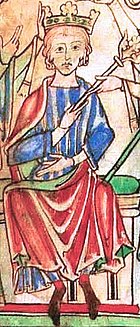Family fortunes and unfortunate families!
‘Bringing it all back home!
‘Tis back to Chinon, we, as a family will always roam,
Therein lies the threat to my hard won throne!
For here in Chinon, from my seat of power, I might well be thrown!’
Thus spake King Henry, with a most heartfelt groan!’
Henry ruled an empire which stretched from the Pyrennes in the south to Cumbria in the north and latterly to Ireland in the west. An able ruler, Henry governed these lands in an efficient manner and successfully protected his borders from invaders. However, home is where the heart is, and Henry’s lay at his beloved Chateau, Chinon in France.
Sainte Radegonde chapel, Chinon.
It would be quarrels of a domestic nature that would thwart Henry’s hopes and which would bring him years of exhausting warfare, including the destruction of his beloved birthplace, the city of Le Mans, shameful capitulation and a sad lonely death, deserted and betrayed by both his wife and his dysfunctional brood of heirs.
‘Good at coping with the threats from outside!
Rather less so in dealing with the dangers from the inside!
Their time, his treacherous sons would bide’!
He had been a fine monarch and father and would bequeath his sons a rich inheritance!
The source of this intolerable sorrow was Henry’s decision to divide his sprawling empire amongst his sons. Like the talented corporate manager that he was, Henry laid his plans for the future in good time and with mathematical precision.
Henry’s sons numbered four. Henry, the eldest would receive the jewels in the crown, England, Normandy and Anjou. Richard would receive his mother’s birthplace of Aquitaine, befitting as he was her favourite son. Geoffrey would be granted Brittany; and John, the newly acquired lands in eastern lreland. Very much a mixed bundle of packages, but a collection which reflected medieval custom and protocol.
‘Decision! Precision! Perdition!
The eldest was Henry, perhaps the sibling most dear to his father’s heart, but he would die young as would the third son of the ‘devil’s brood’, Geoffrey. The second son Richard, his mother Eleanor’s favourite, and formidable soldier who would eventually inherit his father’s empire. The youngest, John ‘Lackland’ so called as he inherited none to speak of from Henry at first. He too would eventually become ruler of the Angevin empire through the deaths of his brothers. Unfortunately it was ‘easy come, too easy go’ as he would lose his father’s hard held lands! John went from John Lackland to John Loads of land and eventually, John Lose-land! A King’s ransom was lost in the East Anglia sand!
‘Henry had been a good king ,
he expected that of his praises, his sons would sing!
No such thing!
These ungrateful boys were only concerned with the riches
that the end of their father’s reign, to them, would bring!’
Mum’s the word! M’mm! Mum ?
That was the problem!
Eleanor of Aquitaine was Henry’s wife and apart from the sons, she also gave him an awful lot of strife! The fresco below, which dates from the 12th century, depicts a number of figures , two of whom are crowned and one, a woman who has red hair. Eleanor was renowned for her mane of golden hair, the hue of which was a fiery red. This was, as it is said, a perfect match for her temperament.
The fresco in Sainte Radegonde chapel, Chinon.
Henry, eldest son of Henry II

Henry’s plan for bequeathing his vast European empire to his brood engendered a thoroughly unfortunate bout of teenage rebelliousness. In 1170, Henry had taken the highly unusual step of crowning his eldest son, the sixteen year old Henry as King of England. He did this because he wished to ensure that there would be no doubt concerning the succession after he had died. However, Henry took the precaution of keeping all regal authority in his own hands. In this way, the teenager could ease himself into the job by serving an apprenticeship which would allow him to craft the skills necessary to take up the reins of kingship when the time came. However, the ungrateful youth saw things somewhat differently. He wanted the power of the throne with immediate effect. When Henry decided to hand three of young Henry’s castles to the youngest sibling, John, the youth fell into a fury.
In 1173 the young colt deserted the old warhorse and with his loathsome brother, Geoffrey, galloped to the stable of his father-in-law, the French king, Louis VII. There he found a sympathetic ear as he vented his spleen about his father. Louis had once been married to Henry’s mother, Elanor of Aquitaine. Louis’s words of sympathy masked a mind preoccupied with self-interest. Louis encouraged the young king to mount a rebellion against his father.
Louis VII of France on his marriage to Eleanor of Aquitaine.

There were others who were only too pleased to assist the young man in this unworthy endeavour. His brother, the formidable Richard, King William the Lion of Scotland, assorted barons as well as the King of France lined up to march under young Henry’s banner against his father. Even his mother, the redoubtable Eleanor slipped out of house arrest in an attempt to offer her son moral support against his father. The ‘Great Rebellion of 1173’ had begun.

